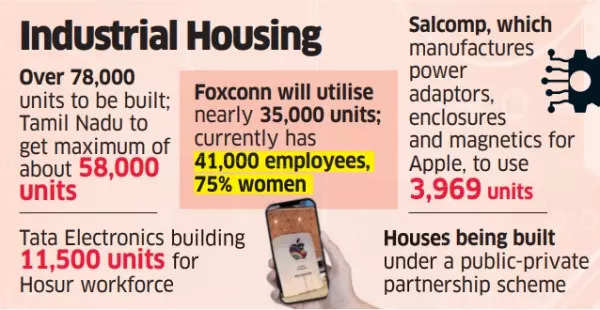[ad_1]
According to government officials speaking to ET, Apple’s contract manufacturers and suppliers like Foxconn, Tata, and Salcomp are in the process of constructing homes for their employees.This initiative, being carried out under a public-private partnership scheme, marks the largest such private sector endeavor in India.
Approximately 78,000 units are slated for construction under this scheme, with Tamil Nadu set to receive the highest allocation of around 58,000 units.
The housing units are predominantly being built by the State Industries Promotion Corporation of Tamil Nadu (SIPCOT), with additional contributions from the Tata Group and SPR India. The funding for this project will see 10-15% coming from the central government, while the remainder will be sourced from state governments and entrepreneurs.

Apple Industrial Housing
The construction and handover to the private sector are expected to be completed by the end of the fiscal year on March 31, 2025.
The primary objective of this extensive employee housing project is to enhance efficiency and provide security, particularly for migrant women employees, a significant proportion of whom fall within the 19-24 age bracket, as per officials.
Also Read | Apple ecosystem becomes biggest blue-collar job creator in India! 1.5 lakh direct jobs created since PLI scheme
This large-scale housing initiative for employees, especially focusing on women, is a first of its kind effort in India, officials said. Most employees currently reside in rented accommodations and endure long commutes to reach their workplaces, posing security challenges, especially for women.
The electronics industry, being location-sensitive and requiring proximity to a major airport for efficient cargo transportation, necessitates comfortable housing for workers who often come from various parts of the country.
Meity secretary S Krishnan told the financial daily about the importance of providing quality housing near factories to enhance productivity and overall welfare outcomes for workers.
Key players like Foxconn, Tata Electronics, and Salcomp are actively involved in this housing initiative to accommodate their employees. Foxconn, a major iPhone supplier in India, will utilize a significant portion – 35,000 – of the housing units for its 41,000 employees, 75% of whom are women.
Also Read | IT sector hiring outlook: What analysis of data on Infosys, TCS, Wipro, HCL suggests
Tata Electronics is constructing units for its employees at the Hosur facility, primarily manufacturing iPhone enclosures for domestic and international markets. Salcomp, known for producing power adaptors and enclosures for Apple, will also utilize a portion of the housing units.
As Apple intensifies its focus on India, the housing project is a strategic move driven by the tech giant to address employee welfare concerns and operational challenges faced in its supply chain.
The company’s commitment to local manufacturing and production has strengthened through collaborations with key suppliers under the production linked incentive (PLI) scheme. This initiative comes in the wake of previous employee issues and factory disruptions, emphasizing the importance of employee well-being and operational stability in the manufacturing sector.
Wistron, now under Tata’s ownership, is expected to develop housing near its factory, aiming to accommodate its 27,000 employees directly.
[ad_2]






